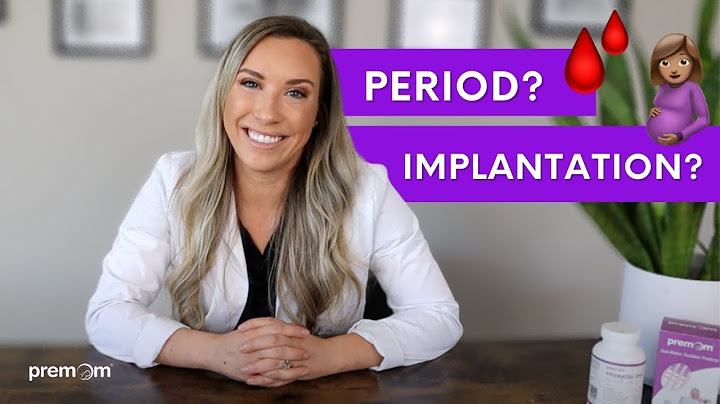Understanding and identifying the signs & symptoms of implantation bleedingYou’re trying for a baby. You’ve done the important ‘making’ part and now it’s a waiting game. A waiting game that probably means you’re keenly looking out for any early signs of pregnancy. Then you spot signs your period might be on its way. Before reaching for a consolation chocolate bar and ordering a new box of ovulation sticks, consider whether it could be implantation bleeding instead. Show
What is implantation bleeding?Implantation bleeding is an early sign of pregnancy and happens when a fertilised egg attaches itself to the lining of the uterus in order to begin growing. It is completely normal and does not need any medical treatment. It’s thought about one third of women experience implantation bleeding. The difficulty is that it happens at a similar time in your cycle to menstruation, so it’s often confused with having an early period. What are the signs and symptoms of implantation bleeding?
The tricky thing is that most of these symptoms can also be early signs of pregnancy. It’s possible that you’ve been checking your boobs for tenderness and scrutinising your undies since about day 18 of your cycle, so how do you know if this is implantation bleeding or the start of your period? What is the difference between implantation bleeding and a period?There are several key differences between implantation bleeding and menstruation which can help you work out whether you’ve conceived or not.
Are there any times when I should be worried by implantation bleeding?This very early sign of pregnancy is not usually a reason to be concerned; it is perfectly normal and no risk to the developing baby. However, if you are also experiencing symptoms such as, lower abdominal pain, nausea, dizziness or vomiting you should see your doctor as is may be an indication of an ectopic pregnancy. Still not sure? As with a lot of early signs of pregnancy, the only real proof that you’re on the path to parenthood is that all-important line on the pregnancy test. If you think you’ve experienced implantation bleeding, the advice is that you need to wait at least 3 days before taking a home pregnancy test. Before that, there’s unlikely to be enough of the pregnancy hormone hCG to give a positive result. If you can bear to wait 5 days, there’s even more chance it will be accurate. In the meantime keep looking out for other early signs. “I’d never heard of implantation bleeding. I just assumed I had had a slightly lighter period than normal and got back to the job of trying to make a baby. I couldn’t believe it when I got a ‘3weeks+’ reading on a pregnancy test a fortnight later!” Answer From Mary Marnach, M.D. Implantation bleeding is defined as a small amount of light spotting or bleeding. It typically occurs about 10 to 14 days after conception. Implantation bleeding is common, and it usually isn't a sign of a problem. Implantation bleeding is thought to happen when the fertilized egg attaches to the lining of the uterus. Implantation bleeding usually occurs around the time you would expect to have a menstrual period. However, implantation bleeding is lighter than menstrual bleeding. Some people don't experience implantation bleeding and others don't notice it. Sometimes, implantation bleeding is mistaken for a light period. If this happens, you might not realize that you're pregnant. This can lead to mistakes when determining a baby's due date. A fetal ultrasound — typically done during the first trimester of pregnancy — can help accurately determine the baby's due date. Implantation bleeding is light, stops on its own and doesn't require treatment. If you're concerned about any vaginal bleeding during pregnancy, contact your health care provider. Sign up for free, and stay up to date on research advancements, health tips
and current health topics, like COVID-19, plus expertise on managing health. To provide you with the most relevant and helpful information, and understand which information is beneficial, we may combine your email and website usage information with other information we have about you. If you are a Mayo Clinic patient, this could include protected health information. If we combine this information with your protected health information, we will treat all of that information as protected
health information and will only use or disclose that information as set forth in our notice of privacy practices. You may opt-out of email communications at any time by clicking on the unsubscribe link in the e-mail. April 19, 2022
See more Expert Answers See also
. Is implantation bleeding possible 3 days after ovulation?Implantation bleeding can occur about 10-14 days after conception when the fertilized egg attaches to the interior lining of the uterus.
Can implantation occur after 3days?Conception (when the egg is fertilized by the sperm) can take place as soon as three minutes after sex or it may take up to five days. Implantation (when the fertilized egg attaches to the uterine wall) occurs five to 10 days after fertilization—which means it can happen anywhere from five to 15 days after you had sex.
Can implantation spotting happen 2 days after ovulation?Bleeding can occur anytime within a week after implantation. Think of it as the afterparty, or even the after-after party. Implantation typically occurs 6-12 days after ovulation/fertilization, although some sources give it a wider range of 5-14 days. The average is 8 or 9 days after ovulation/fertilization.
|

Related Posts
Advertising
LATEST NEWS
Advertising
Populer
Advertising
About

Copyright © 2024 kemunculan Inc.


















